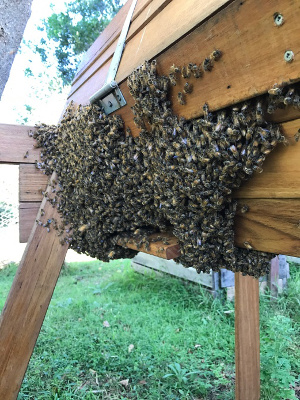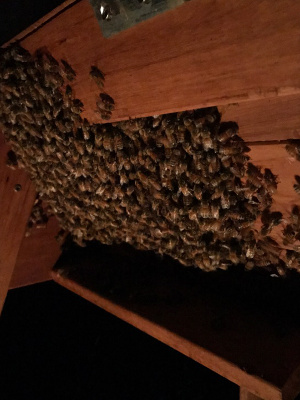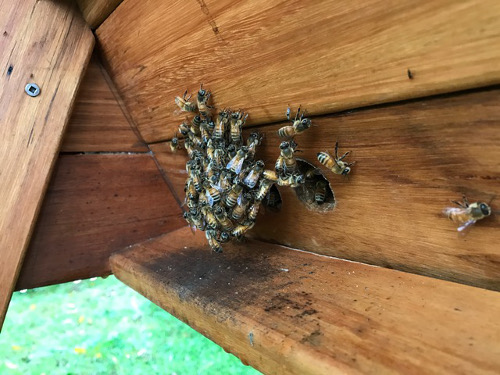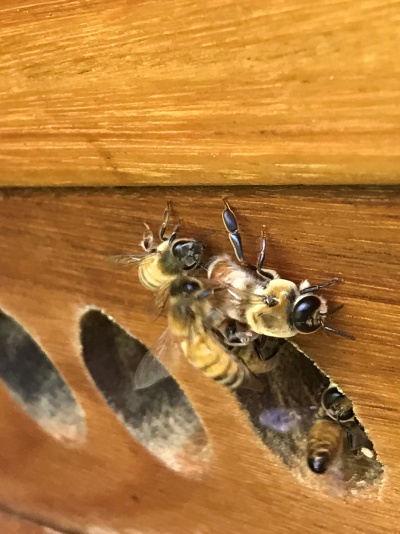News & Events
Bee Wisdom
July 29, 2017 | What's The Buzz?
Wisdom – omnipotent moving- embracing this world,
informing everything that is and everything that has life
in one unending circle.
You have three wings.
The first unfolds and flies through the highest sky.
The second dips down, touching the earth.
The third whirls its way over, and through all things.
We praise you, Wisdom, for You are worthy of praise.
Hildegard of Bingen
Our bees, in their own wisdom have adjusted well to the climate changes here at the Abbey. It has been a challenging time for the new colonies, and we have had to exercise some stewardship of creation to help them along in their first season.
Late January brought consistent days of heat. Watching how our bees adjusted to the heat in January filled me with awe and a deep respect for these little creatures. Bees maintain a constant temperature inside their hive. This is so the brood can flourish and the hive will stay healthy. When the temperature outside the hive is very high, the bees all gather outside the hive and hang together near the hive entrance. This is called bearding. With less bees inside the hive, there is more room for air flow and temperature control is more manageable.
The first picture was taken at 6pm on 10 February. The bees are bearding around the holes at the hive entrance.

The second picture was taken at the same hive at 5.44am on 12 February. The sun has only just begun to rise, and it was so warm the bees were already bearding at the Margie Hive.

In between the hot days and for six weeks afterwards, it rained heavily. Initially this created a lot of humidity, and the bees in their wisdom dealt with this by hanging over two of the entrance holes to the hive, which helped to control air flow.

And here is a short movie of the bees in action doing the same thing:
In our natural beekeeping top-bar hives, we allow the bees to build their own comb, rather than use a wax guide for them. This enables our bees to build the cells of the comb to whatever size they need. We trust that they know what they need, as they would in the wild. This method allows us to see the appearance of drones, which are male bees. Drones are much larger bees, with enormous eyes. We believe drones are an essential part of the hive, and their main purpose is to mate with a potential queen. Having drones appear means that we will have good genetic diversity, and all future queens, particularly for the wild hives in tree hollows in the surrounding forest, will have only mated with the fittest and healthiest drones. This, in turn, creates healthy, vigorous colonies of bees that can resist disease and potential predators (such as hive beetle etc). This is our gift to the survival of bees, and an important part of our stewardship. Once the season has finished for drones, and the hive begins to reduce its size in preparation for winter, the drones are evicted. Below is a picture taken on 6 April at about midday, showing a drone being chased out of the hive by two bees:

All of the hives in our apiary are happy and healthy, and we have had to work with some of the newer colonies to ensure this. The large amount of rain in February affected the predominant eucalypt here at the Abbey, Eucalyptus quadrangulata, and it didn’t flower. Its nectar is a huge food source for our bees. As we reduced the internal size of the hive space (so the bees can maintain their hive space temperature more easily) we realised that some of the smaller colonies needed feeding prior to and during winter. So, we have been feeding our bees a biodynamic mix of sugar, water, chamomile tea and salt. The sugar water is harsh on the bees’ intestines, and the chamomile tea helps. We try not to feed our bees, but there are times when it is necessary. Sr Veronica has been enjoying taking a cup of tea regularly to them!
During winter, as well as feeding the new colonies, we are giving our hardwood hives a good coat of wax and oil as maintenance and protection. This rejuvenates the wood after the heat of summer, and prepares for the high winds that arrive somewhere between August and October each year. Also, during this winter, we are sourcing wood for the next stage of construction of new beehives for our apiary.
Our next natural beekeeping training course will be conducted here at the Abbey Apiary on 9-10 December. Please do join us for a wonderful weekend of beekeeping with our mentor, Adrian Iodice from Beekeeping Naturally. We will be learning about the natural wisdom of bees and how to work alongside them in a Kenyan Top-Bar Hive.
More information about the weekend can be found here:
https://www.beekeepingnaturally.com.au/course/learn-natural-beekeeping-jamberoo-nsw-december-2017-12-09/










